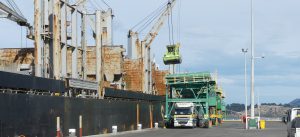
Canterbury is a one-of-a-kind place. Even Canterbury’s soil requires special nutrients for our strong agricultural sectors to thrive.
Ravensdown, a New Zealand-owned fertiliser co-operative, provides these specific nutrients in the form of superphosphate and compound fertilisers, to Canterbury farmers from Waimate to Kaikōura.
LPC is the main gateway for these products, and is Ravensdown’s largest import location for the South Island. In fact, Lyttelton is Ravensdown’s second largest import location in the country, just behind Napier.
Ravensdown’s National Logistics Manager Ant Boyles says this speaks to the significance of the relationship between the companies.
“The Canterbury region accounts for a significant percentage of our total business,” he says.
“We have a manufacturing site in Hornby that requires raw material from offshore to produce superphosphate-based products for our farmer shareholders.
“LPC is a key stakeholder in our operations, and as the largest bulk customer of LPC we are also a key stakeholder of theirs; we have a very good relationship with LPC at all levels, from the CEO and account management through to operations,” Ant says.
The majority of this importation is brought in on dry bulk vessels, which are processed in LPC’s Inner Harbour. This comes in on about 30 vessels a year, operated by our shipping joint venture Ravensdown Shipping Services.
In addition, Ravensdown imports approximately 650 TEU (twenty-foot equivalent units) per year of specialised fertilisers and agrochemical products through the terminal.
Ravensdown accounts for about 10,000 truck movements on and off the port, to locations such as their Hornby manufacturing site.
Covid-19 and global supply chain issues have caused challenges across the board for the shipping industry this year, and Ravensdown is no exception to feeling these impacts.
“This year has seen some creativity and outside of the box thinking from the port to accommodate our requirements, most notably discharging the Stony Stream on Cashin Quay – the first bulk vessel to do so since the earthquakes,” Ant says.
“In general, the performance of LPC on our cargoes has been better than expected, taking everything into account, and our discharge efficiency over the last 12 months has actually improved through the port which is a credit to all our bulk discharge stakeholders.”
Ravensdown has experienced shipping delay impacts at all New Zealand ports they use. But, Ant says, the future is looking bright for their customers.
“We have amended our planning to allow for increased lead time from our international suppliers, so have by and large been in a strong supply position to meet the needs of our customers,” he says.